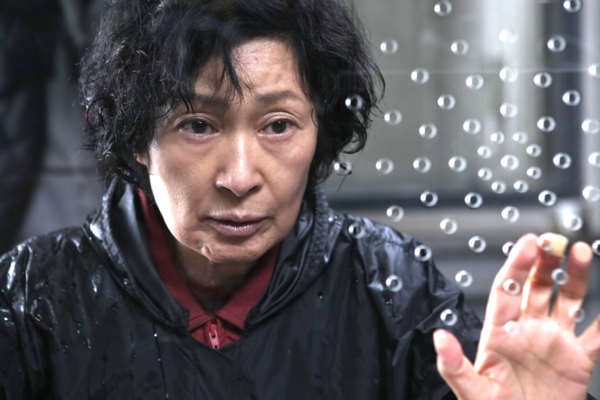Movie review by Greg Carlson
“Mother,” Bong Joon-ho’s follow up to the wild monster movie “The Host” is another genre-bending thriller that blends intellectual acuity with voyeuristic sparks. Deftly balancing suspense, fear, black-hearted comedy, and a touching poignancy, Bong confidently envelops his viewers with filmmaking gifts that echo masters like David Lynch and Alfred Hitchcock. The prickly relationship of the title character to her son invites comparison to “Psycho,” and the amateur sleuthing that drives the plot mirrors “Blue Velvet.” Best of all, “Mother” stands refreshingly on its own, recalling the aforementioned works while retaining a unique style and voice.
An herbalist who practices acupuncture sans license, Hye-ja (Kim Hye-ja) smothers and dotes on her simpleminded adult son Do-joon (Won Bin), an idler who hangs out with a small time hoodlum, Jin-tae (Jin Gu). When Do-joon narrowly escapes serious injury in a hit-and-run car accident, he and Jin-tae track down the wealthy perpetrators on a golf course, engaging in a slapstick melee that results in a trip to the police station. Bong paints this action with broad brushstrokes, but there is nothing wasted in the tactic, as the audience gathers all kinds of information that will come in handy as soon as the narrative shifts in the direction of an altogether more sober tale.
Bong’s goofy opening act contrasts sharply with the brutal murder of a schoolgirl who was seen briefly by Do-joon on the night of her death. Once Do-joon is coerced into signing a murder confession, “Mother” begins to smolder, as Hye-ja expresses the lengths to which she will go in order to exonerate her son. She attempts to hire a lawyer, but the busy attorney she retains initially brushes her off. Determined and relentless, Hye-ja turns self-appointed bloodhound, tracking down leads and managing the case with more competence than the police detectives exhibit.
“Mother” is calculated and exacting, but Bong refuses to let the plot-heavy structure of his narrative get in the way of the rich details that bring the unusual characters to life. As Hye-ja toils to unravel the mystery, Bong meticulously rations tidbits of information about her, surprising viewers with each revelation. Like the best hard-boiled detective novels of Hammett and Chandler, Bong also pounds out a code of morality, perching the protagonist in a precarious position between salvation and sin. In one terrific scene, Hye-ja hides in a closet while someone she is investigating has sex with a young schoolgirl not unlike the murder victim. Like Hitchcock, Bong is able to convey the simultaneous rush of excitement and shame as Hye-ja, and the audience, cannot resist peeking.
No doubt some viewers will recoil at Bong’s choices in the film’s final movement, in which the director depicts all kinds of shocking intrigue designed to challenge viewer expectations and raise thought-provoking questions about the obligations of family ties. Anthony Lane has accused Bong of wrecking the equilibrium of the movie, but others will certainly contend that the filmmaker holds on to every bit of the supple plasticity that governs his view of human nature. By the time we witness the haunting final image – a curious dance both melancholy and uncanny – we will ask ourselves whether we would or could do what Hye-ja has done for her child.
